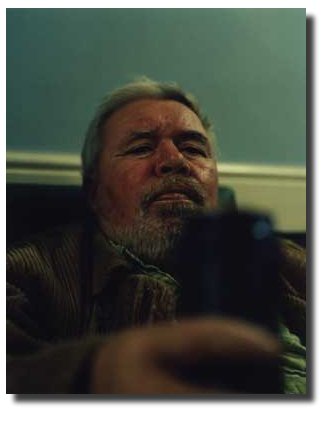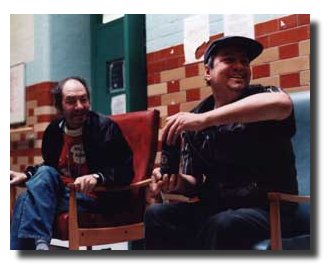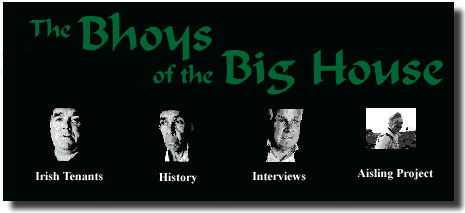|
" We're Classed As Dossers..."
Frail and unwell, when I spoke to him, "Johnny"
was one of the many old sailors that live in the House. There are many
Scots and English sailors, and other nationalities, as well as Irish,
but what the Irish have in common is that they went on to work "on the
buildings" when they finally came ashore.
Johnny's narrative graphically illustrates the mixed feelings
that many Irish have about returning " home ". Although there remains
a strong attachment to Ireland and Irishness, there is also the fear
that, if they did return, in their present circumstances, they would
bring shame and disgrace on themselves and their families, because they
have not lived up to the expectations [success, wealth] that migrants
have traditionally had. There is also the fear that patterns of behaviour,
established in the Navy, or in the world of building site and pub, and
especially regarding the use [and abuse] of alcohol, would be out of
place in rural Ireland.
Johnny's Story.
" I come from Co. Antrim, a place called the Glens of Antrim.
There was five of us. Three sisters and one brother. I went
to St. McNessie's college. I couldn't take the college life at all.
I was there a couple of years. There was boarders there, but I wasn't
a boarder, I only come from four mile away from it. I was a 'day-boy'.
They were all priests, the teachers. They were good guys. Good guys,
y'know. There were a couple of lay teachers there, but most of them
were priests. Intelligent men. You could learn French, German, Greek,
anything. They could teach you. That's what I don't like about this
country [England]; they say about the Irish:
" Did you hear the one about this Irishman? He's thick ! ".
They were far from thick [angry] ! You know that.
In 1955, I joined the Merchant Navy, as a deck boy. I was
sixteen. Everybody where I come from, joined the Merchant Navy. Virtually
every bloke. Where as, the girls become nurses. Because there's nothing
else there for ye. It's the most hungriest part of Ireland you were
ever in, in your life.

I was talking to this Timmy Murphy [also from the Glens of Antrim]one
night, at the Catholic Seaman's Mission in Liverpool, Atlantic House,
and I said,
" Are ye going home, Timmy? ".
And he says " yeah ".
So, I asked him, " what's it like over there? "
And he said, " same as it ever was: old age pensioners, and youngsters
going to school."
There's no in-between. The girls is working in hospitals
in London, Liverpool, Manchester; and the blokes are all at sea. There
was nothing else for ye to do. Bar [unless] ye wanted to work for a
farmer, for £3 a week or something. From daylight in the morning, till
dark at night. Sod that for a business.
At first, it was local [sea trips]. Then I went what you
call "deep sea". Belfast Shipping Federation. The first thing you were
asked when you went aboard a ship was,
" Are you a 'Taig' [Catholic] or a 'Prod' [Protestant] ? "
And I didn't take to this carry-on at all. Doesn't matter to me WHAT
a man is. As Brendan Behan said, " I don't mind what colour or religion
a man is, as long as he drinks !! " [laughs]
So, uh, I transferred to Liverpool, where there was a lot
of Irish from the Republic, and Scotsmen, and what they call "a foreign
crowd". Nobody was giving a monkey's what you were, or who you were.
You were just shipmates, and that was it.
The sea is an easy-going way of life; it's not like pulling
cable , a poxy thing like that. It's a cushy way of life. Cheap drink.
The bond, it's called. You can get a bottle a whiskey, or a bottle of
rum, or whatever you want, a week. And twenty cans, and at one time
it was 5p a can. But, you find few drunkards at sea. When they come
ashore, that's different weather altogether [grins]. They're wild, y'know.
At sea, they might have a few cans and read a few pages of a book. When
they come ashore, with the pay-off in their pocket, all hell lets loose.
They're bad fer drink, women and Christ knows what.

I seen a good bit of the world, of course. Most of it.
I was stupit, now, when I think back on it. I should have
[jumped ship]. I was in one ship called the King George - never mind
the fancy name, she was a 'tramp'. What they call a 'tramp steamer'.
We were running from North Queensland in Australia, to Hong Kong, and
Japan, with sugar. And a few mile away -it's a city now, but it wasn't
a city then - was Cairns. There was a place called Mount Isa, and the
money was fantastic. There's all sorts of mines on it, and every kind
of ore, tin. Everything that ye could find on the face of this earth,
is on Mount Isa. This is history [fact] - there was seven Irishmen jumped
that ship. At that time, I was only about nineteen, stupit. I should
have done the same, y'know. I was getting £40 a month AB [above board],
and here's these guys jumping ship, left, right and centre. And subbing
up to the hilt [getting as much advance wages as they could]. They went
to work on Mount Isa, and they were getting four times that much a month.
The skipper knew what they were doing, but he had plenty of other seamen
to take their place.
And there's me, like a mug.
I was in Panama once, and I missed a ship, the San Andair.
Not Panama City, this side of the Panama canal, Cristabel. The San
Andair was sailing at four o'clock in the morning, and me, being
a seaman, I was with a woman. So, [laughs] that was end of story. And
I spent twenty-eight days in an immigration station. Och, ye could walk
out every day, like. It was just like being in here [the hostel]. There
was the Americans had the Panama canal that time - it was called the
United States Panama Canal Zone. It was full of American soldiers. I
went to the American armed forces recruiting office. They wouldn't have
me. If Vietnam hadda been on, they would have had me. This guy sitting
behind a desk, and a big American flag behind him. Y'know what his name
was ? Major J. Murphy. I thought, I'm sound here.
I said, " I want a job ".
Because, I knew that when I got back here, I had no money
to come. I was paying my way. Most of the other fellas at the immigration
station were paid off with an operation for an appendix, or a broken
leg, somethin' like that, y'know. Their wages was still going on. Mine
wasn't. I was getting money stopped [out of my wages] and after twenty-eight
days, I knew that when I got back to Liverpool, I'd have nothing to
come. So he says, under the - I forget the name of the act, Lodge, some
political guy:
" We can definitely accept you, you're physically fit, but we can't
employ you... ".
If I hadda got in, within two years, I would have been an American citizen.
But it didn't work out that way.
Aww [sadly], I was invalid-ed out when I was nearly thirty,
with TB. I spent six months in the hospital. I never could believe that
anything like THAT could ever happen to me. I was as strong and fit
as you are. But they'll never accept you after that. Because the reason
is, say you had a recurrence of TB, and you got it in America, or Australia,
anywhere, the shipping company has to pay your hospital bills. You're
covered by your stamp, and they have to foot the bill, and then foot
the bill for your plane home. So they won't take a chance on it.
And I come out [of hospital], and I started working for
all the Irish subbies [in London]. I was still fit enough for work.
This was in the early seventies. At that time, there was plenty of work.
John Murphy, Lowry's, McNicholas, they couldn't get enough of men. They
were nearly fighting one another to get Irishmen.
I've been all over the country. I've worked all over the
country. England, Wales, Scotland. Worked all over the place. Mostly
cable [laying cables], digging trenches, using jack-hammers. I'm GLAD
now that I'm not fit for it ! Did you ever do any of it ? [shakes head,
grimly].
But now, I've got a steel plate joining me hip and me thigh
together, and I'll work no more.
But anyway, it's all changed today, as you know yourself.
The building work is finished. Cable work, everything, is finished.
I'm here [in the hostel] six years. Before that, I was in
different kip-houses, Tooley St., Salvation Army, different places.
It's a sad story, I suppose, in a way. As the Americans say, that's
the way the cookie crumbles.
I don't like Camden at all, to tell you the truth. Blokes
was telling me here, old blokes, old Irish blokes that I drink with,
that Camden was a great Irish centre years ago. Greatest in Inglann.
But now...[grimaces]. There was great cafes and all that in it. Great
craic, and carry-on, with the cafes full of Irishmen, after them finishing
work. Boiled bacon and cabbage. You don't get that now. Look at the
names on the pubs that ye pass - the 'Rat & Parrot', all that carry-on.
At one time you had good cafes, good pubs; but imagine today, £2.40
for a pint of Guinness. That's ridiculous.
I had a mate here who was two years younger than me - he
was 55. We went to school together, we served mass together, went to
sea together. He only stayed here [in London] a month. " I can't stand
it," he says, " two out of every three here, is HEADERS [crazy] !."
There ARE a few, maybe me included [laughs heartily].And he stayed one
month, and he said, " I can't take it, I got to get out of here ". So,
he's pissed back off over there [Ireland]. He couldn't stand it.
Me ? No, I don't think I'll go back to Ireland. I haven't
been back in forty years. After my parents was dead, that was end of
story, because, my brothers and sisters has got houses and cars [pauses]
...and families. There's nowhere for my way of life. Might be able to
stagger around two or three nights of the week, but not every night
of the week.
McRauley, my mate, that I went to school with, and sea with,
he says,
" I want to be buried in Antrim," he says.
I says, " they can throw me into a skip at the side of the road, as
far as I'm concerned !. [Laughing] The council won't let me lie there,
or I'll start to SMELL !."
[Seriously] I couldn't care.
[Sadly] Ireland is forgotten. I wouldn't want my people
to see me like this, for God's sake.
I had my "accident" a few months ago. I came out of the
hospital on the fifth of February. I tole them in the hospital that
I fell, but I didn't. I fell out with a psychopath, what I would call
a psychopath. An English guy. He's a lot younger than me, and bigger
and stronger. He put me down, but he wasn't happy wi' that. It was a
thing I never down in my life to a man [makes a gesture to illustrate
kicking somebody prostrate]. He broke the thigh. [Quietly] And the hip.
And I was lucky they reckon.

I had a drink on me, but I wasn't drunk. I can remember it well.
There was a Scots guy and an Irish guy. They were mates, they were drinking.
And they jumped in, and they pulled him to the ground. They reckon he
was going for my head. If he'd a went for my head, that would have been
the end of the story, y'know.
But I didn't tell them that in the hospital, I tole them
that I fell down the stairs. And this fella was sayin' to me,
" You're a so-and-so mug ", he says, " send for the police ", he says,
" and you'll get criminal injuries [compensation]".
But, I get the invalidity. I get £112 a week, in here, y'know. I got
a powerful doctor. I thought he'd be no good, this guy. He worked for
the DSS, Social Security, but he turned out a different guy, altogether.
A great guy. He took all the statements off me and - I tole him the
same thing, a course, that I had fell down the stairs. Which I didn't
do. Never done.
About eight days afterward, I got a giro for £600, back
money. Yeah, I had it in a Post Office [savings] book, but it's gone
now. My key worker, she comes from the Bahamas. She's a lovely girl,
she sent my book back for me. Before, I was getting £65, now I'm getting
£112.
About twelve months ago, there was a bloke killed outside.
Ali Khan, ye called him. And the police arrived. Ohhh, they interviewed
every man in the house :
" Where were you at 6.30 Friday afternoon? "
I says, " I was in my room, here, drinking, same as I usually am."
I knew the poor man to see, but I didn't know him personally. He was
a Pakistani.
One fella belted him and his head hit the step.
This copper asked me what I done, I said I was in the Merchant Navy.
" Were you around much? "
I says, " all over. It was my way of life."
This copper was sitting there, in front of the wardrobe, and he says,
" I've met more Irishmen, in here, that have been in the Merchant Navy,
the Royal Navy, the Royal Air Force, the Army; yet most of the people
[outside] refer to the Arlington House men as 'dossers'. These AREN'T
DOSSERS !," he says.
Yer man [the policeman's colleague] just nodded. " These are no dossers,"
he says. " These men have been in places me and you have never even
heard about, " he says. " And done things we've never even thought a
doing. These men fought through wars, and Christ knows what," he says.
" I was interviewing a guy in a room, there, who was in Korea....".
That's it. We're classed as dossers.
I mean, at one time, this house held 1100 men, and about 800 of them
went to work every morning, every day of the week. Murphy, Lowry, McNicholas
.
So, they couldn't be dossers.
Postscript.
Johnny passed away, shortly after this interview was completed. He
is missed by the staff, and his many friends, in Arlington House.
OTHER INTERVIEWS
|









